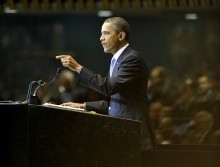The trip of US President Barack Obama to Israel has on the surface been relatively staid: No grandiose peace plans or attack plans. No groundbreaking decisions. But the details coming from Obama and Israeli Prime Minister Benjamin Netanyahu shed crucial light on the approaches their respective nations are taking on Iran’s nuclear program. And it appears that Israel is further away from demanding a strike on Iran, even as the odds of an Israeli attack have increased.
Detail 1: Netanyahu’s Evolving Deadline
Last year, Netanyahu offered a grave assessment at the United Nations on the time left to prevent Iran from getting the bomb. After explaining how nearly impossible it is to stop a fully-stocked Iran from simply assembling the bomb or even from completing the final stages of research and construction of one, Netanyahu pointed to the nuclear fuel enrichment process as the red line on Iran’s progress.
He said that by the time Iran had a sufficient stockpile of low and mid-level enriched uranium, they would be close enough to further enriching it to weapons-grade that the world would essentially be too late to stop them. So Netanyahu identified this spring or summer as the key date when Iran would reach that threshold, that red line.
Obama, by contrast, has certainly not acted or implied that he agreed with that assessment. This painted Israel and the US as sharply disagreeing on this issue.
Now, as Obama noted in his comments in Israel, the two nations are barely divided—at least publicly. It appears that shared intelligence or mutual compromise has brought their positions closer.
Netanyahu never mentioned his earlier timeline in any of his Iran comments with Obama. He spoke with urgency, as Iran is getting nearer to the bomb, but there were no specifics. In other words, he’s giving Obama space for his diplomatic effort on Iran. That’s significant, since it was Netanyahu who urged the world to set a clear deadline on diplomacy for Iran.
Detail 2: Netanyahu’s Evolving Timeline
Obama told Israeli TV that Iran was at least a year from building the bomb. Netanyahu, after clarifying that building a bomb is different from the enrichment process he has warned would be all but finished by this summer, the Israeli leader agreed that it would take Iran a year from now to build a nuclear weapon if they chose to do so.
This also represents a change. In his UN speech, Netanyahu had said that once Iran enriched enough uranium, it could take mere months for Iran to build a weapon. Now he has given Iran more time for that process. In other words, Israel again is backing off its immediacy on Iran.
So what did Israel get in exchange buy phentermine now from Obama?
Detail 3: Obama’s Evolving Line of Fire
The one thing Netanyahu repeatedly noted on Iran that sounded particularly aggressive is that Israel can defend itself by itself. What’s more, Obama himself recognized that right in his comments in Israel.
“Each country has to make its own decisions when it comes to the awesome decision to engage in any kind of military action, and Israel is differently situated than the United States,” Obama was quoted by the Israeli Press Office as saying. “And I would not expect that the Prime Minister would make a decision about his country’s security and defer that to any other country, any more than the United States would defer our decisions about what was important for our national security.”
In short, Obama essentially said that he would not stand in the way of Netanyahu acting to defend Israel by attacking Iran. This was significant, because in the past it has remained unclear what the US might do if Israel acted on its own. After all, it has long been estimated that Iran might try to drag the US into the conflict by attacking American targets should Israel act.
But Obama’s comments appear to imply that the US would not act against an Israeli attack—by warning Iran, for example—to try and distance themselves from the conflict. Nor does it appear that they would intervene in other ways, such as imposing a premature ceasefire or threatening to reduce military financial aid.
Obama’s comments effectively return Israel to the role of the world’s attack dog—the most realistic and unpredictable military option for stopping Iran from getting the bomb. Iran is paranoid about Israel, and Obama is playing that to his advantage.
In essence, Obama’s statement told Iran the following: “Beware of attack dog. Trespassers act at their own risk.”
Conclusion
The Iranian issue has been a point of troubling disagreement between the US and Israel, even to the point of public contradiction of the other’s positions and posturing in the media. But the discussions between Netanyahu and Obama during the latter’s trip to Israel seems to have been successful at sweeping all that under the rug.
To sum up, Israel appears willing to give the US more time to let the latest round of diplomacy work, while the US is willing in return to not stand in Israel’s way when their clock finally runs out.
Iran better take notice and take advantage of the latest offers of compromise from the West. Because even if the US is unwilling to attack Iran’s nuclear program as a last resort, the Israeli military option is very much on the table.
(By Joshua Spurlock, www.themideastupdate.com, March 22, 2013)

